How To Salt Preserve Herbs For Winter- is one of the easiest methods for preserving herbs you grow in the garden. The leaves will stay fresh for months and can be used in cooking or baking with no problems.
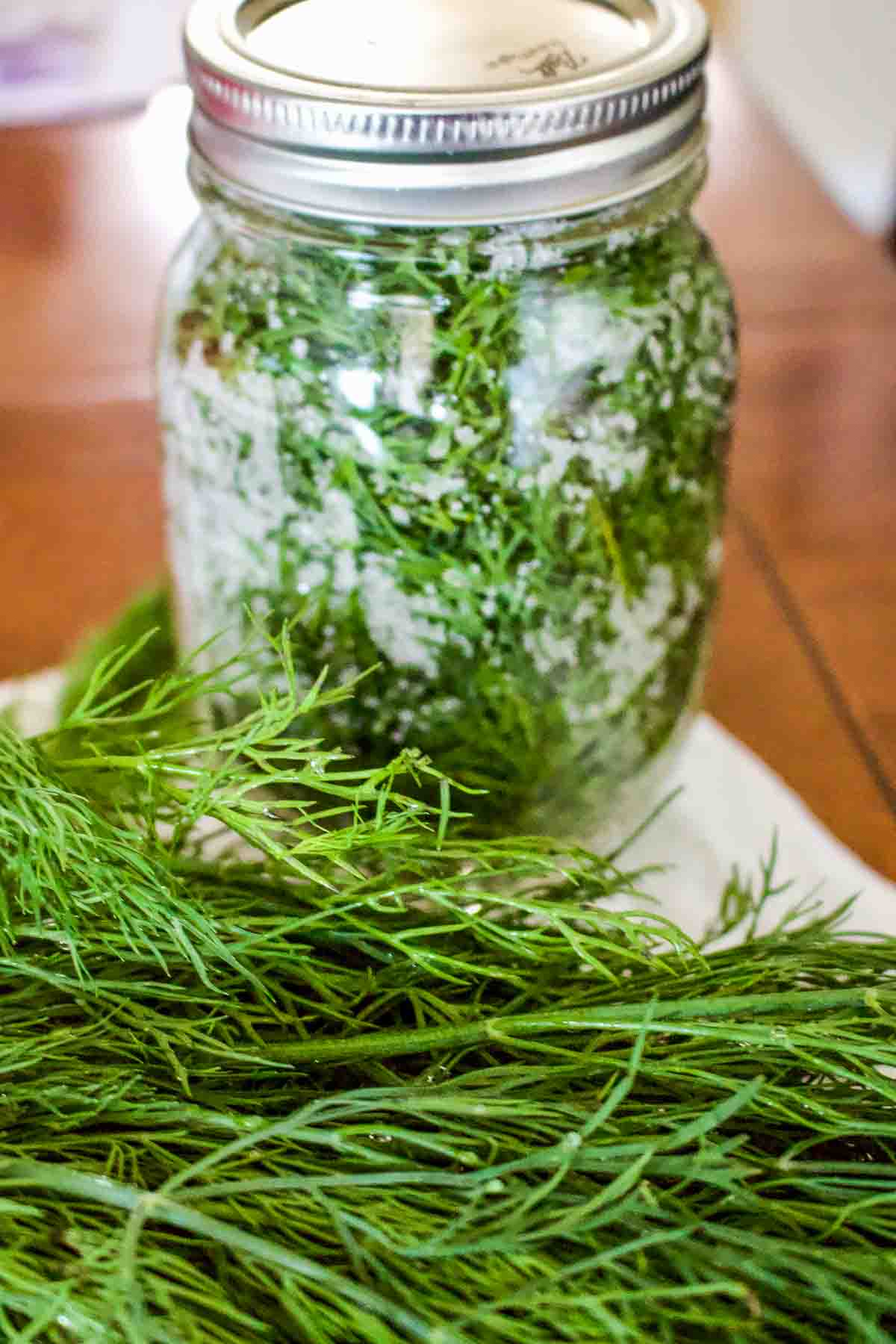
If you grew up like me in a place where people used to eat in season and also can fruits, vegetables, and meats for winter, you might already know how to preserve herbs for the cold season.
Most people today would dry or freeze their herbs, but do you know that there is another way of preserving these beautiful aromatic herbs?
Jump to:
Preserving in Salt:
This is an old-time method of preservation. We often think of using salt in the context of the pioneers and people who did not have refrigeration or freezers in the past.
However, this method is still an excellent method of food preservation, and it is used everywhere, especially in the food industry.
For this process, I recommend either sea salt or kosher salt, but canning & pickling salt will work, too.
Using table salt is acceptable, but it should not contain iodine, as it is not good for canning.
Today, I will show you how I preserved dill, but there are other herbs suitable for this method:
- Parsley
- Rosemary
- Basil
- Celery leaves
- Chives
This is my guide for using herbs on a daily basis.
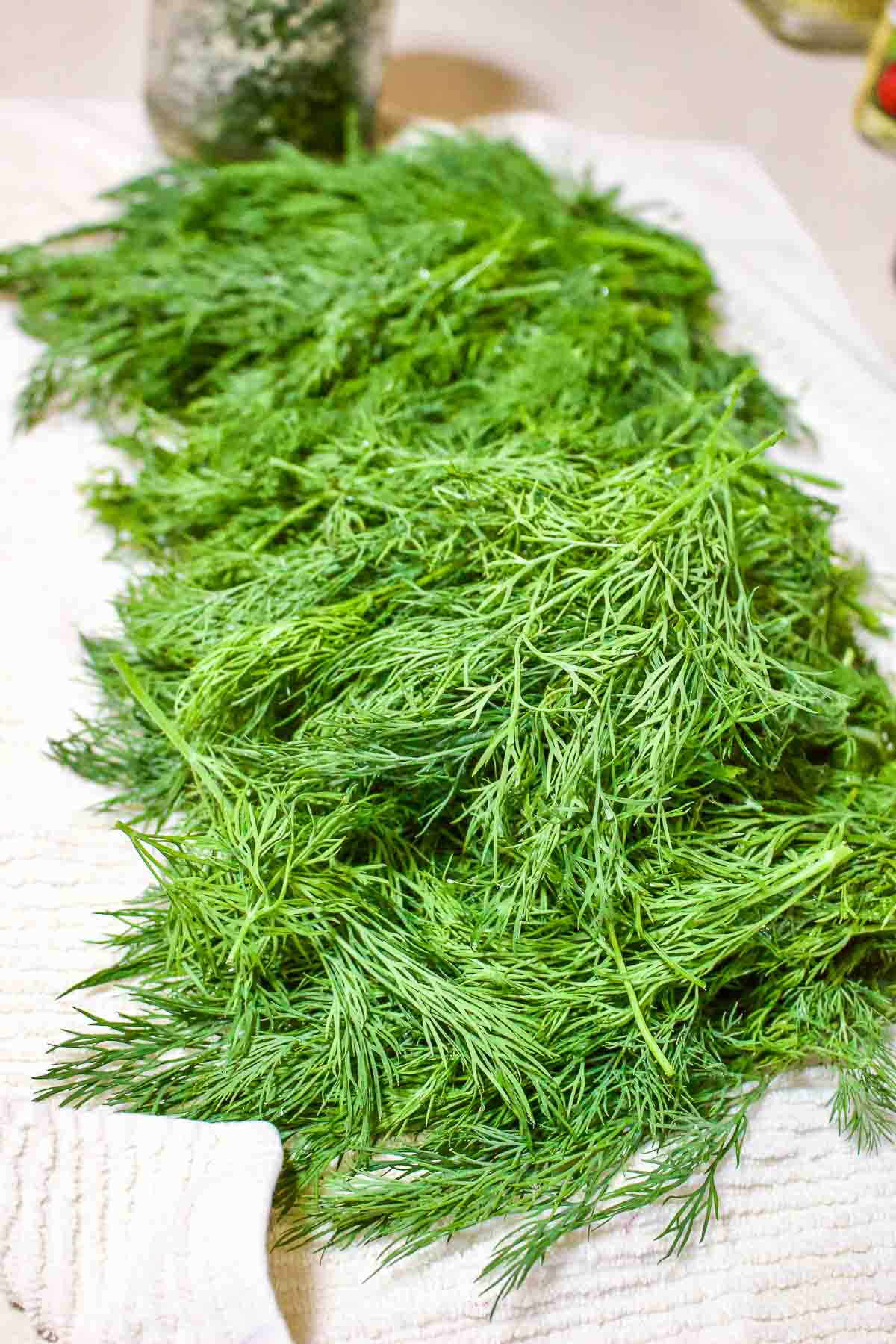
How to preserve herbs in salt for winter
This is by far the easiest method for preserving herbs you grow in the garden.
Step 1. In a clean glass jar, add a layer of salt to cover the bottom.
Step 2. Clean, wash, and dry the herbs, remove all the thick stems, and discard them.
Step 3. Add the herbs in layers, alternating with salt, until the container is full. Refrigerate.
Step 4.The next day, you will notice that the herbs lost volume, so the jar is filled only half now. Keep adding salt and fresh herbs until you fill the jar up again. Refrigerate.
Note: Here is a jar I started yesterday. This morning, the volume of the dill went down, and the jar looked like this:
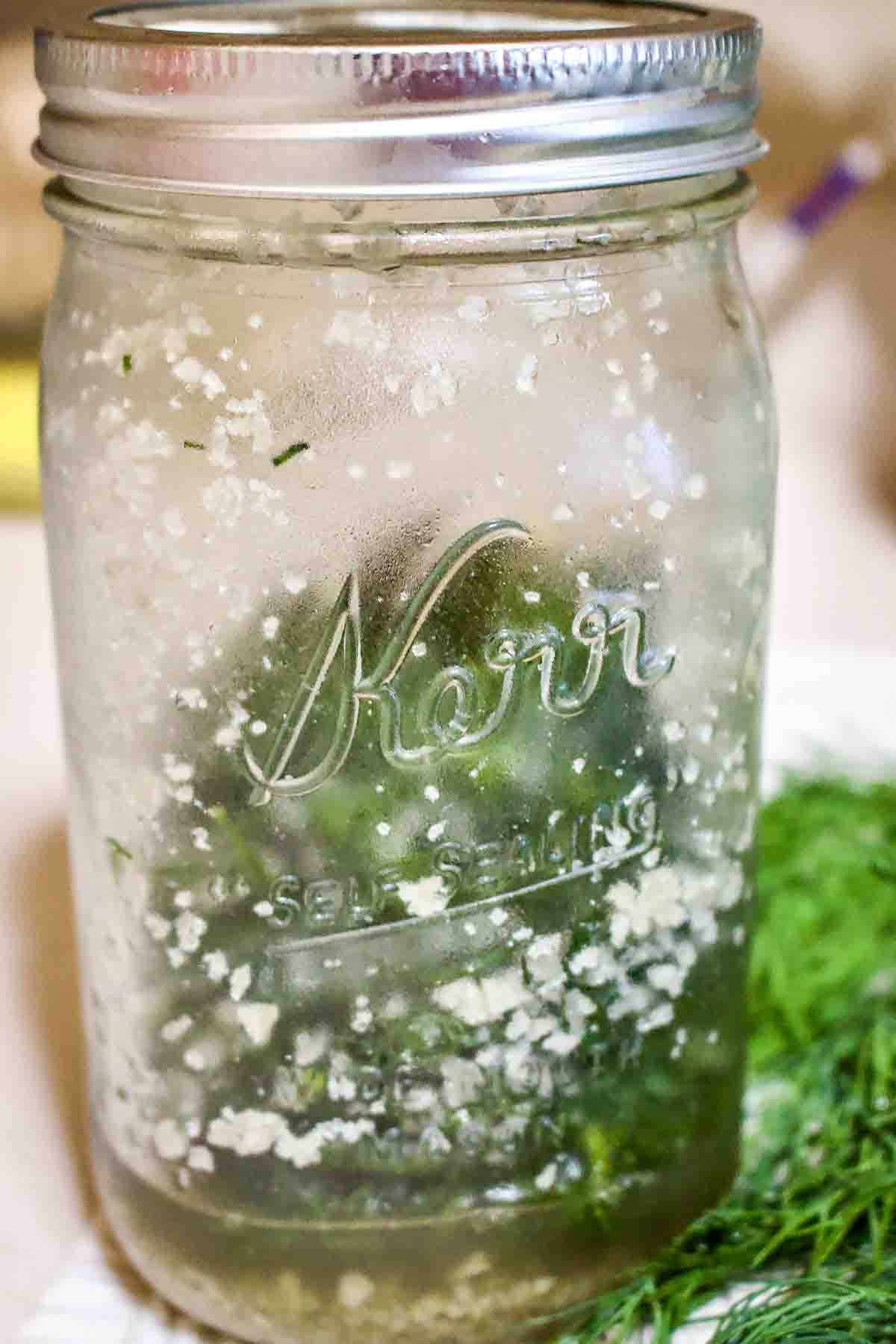
I kept adding salt and fresh dill until I filled up the jar again. You will notice that there is dill juice on the bottom of the jar.
This is okay, as that juice will preserve the dill for the following months.
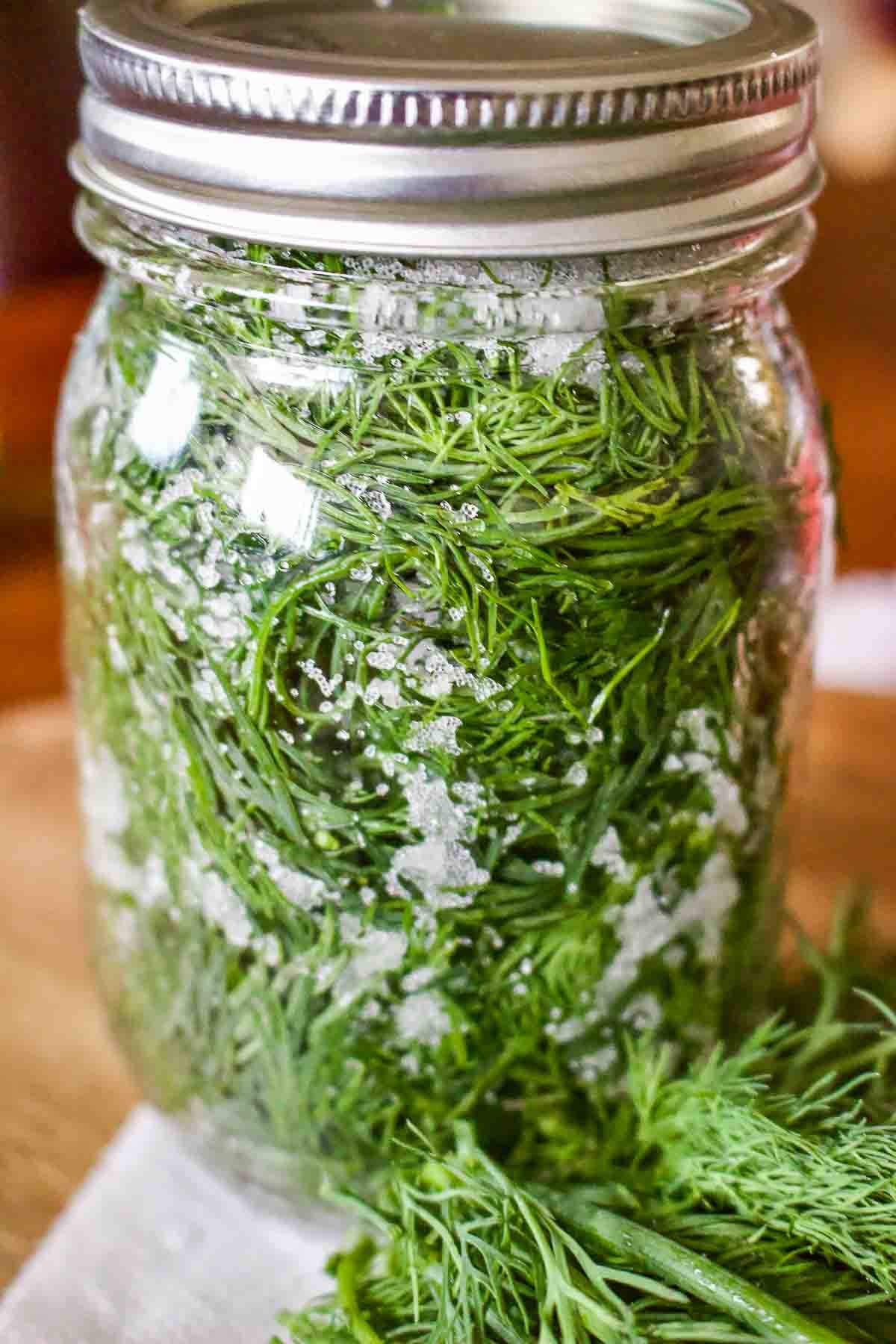
How To Use The Herbs
The leaves will stay surprisingly fresh and flavorful for months. To use, just remove the amount of herbs you need from the jar. Brush off the salt or rinse under cold water.
Make sure you add less salt than the recipe requires. The herbs are already salty. As an added bonus, the salt will become flavored over time and can be used in cooking, too.
Consider using it in spaghetti sauce, fish, soup, savory baking, bread, or rubs. Luckily, there are no hard and fast rules, so experiment with your own herbal salt blends and enjoy!
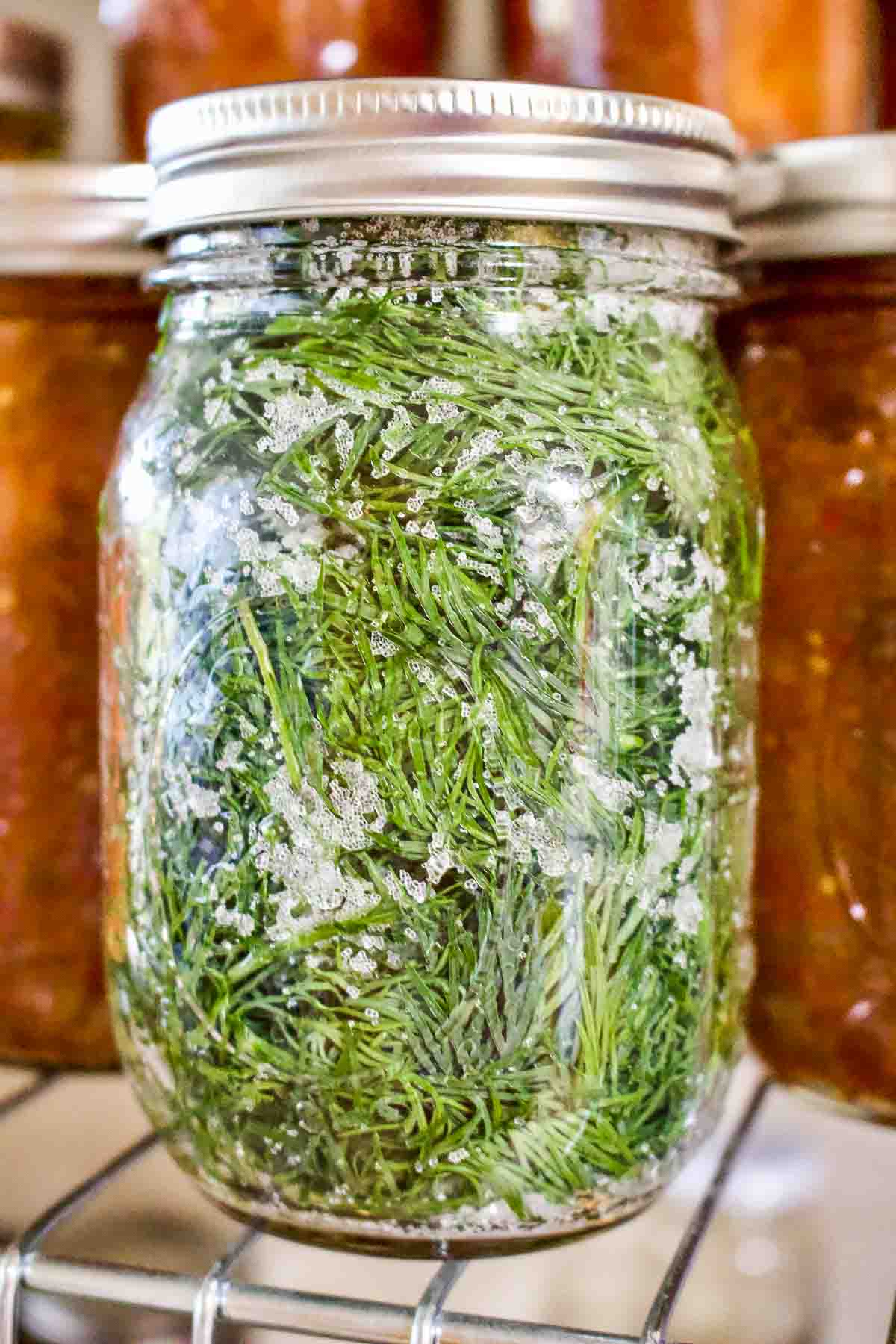
Recipe FAQs
The herbs have to be kept in a cool place. Do you have a cellar, a pantry, or a cold basement? Use that! But if you live in an apartment and you don't have the space(like I do), then the refrigerator would be the way to go. The refrigeration helps to extend the shelf life of the herbs.
They should be packed as much as you can, making sure there is enough salt to cover them. Keep adding herbs until you fill up the jar.
You will notice that the herbs lose volume, so as soon as that happens, keep adding herbs and salt until the jar is full and you cannot add herbs anymore. Keep them in a cool pantry or the fridge.
Observation
I noticed some articles out there that teach you the same technique but with chopped herbs.
While for some people, chopping the herbs and mixing them with salt might work, there are many people out there who cannot or do not want to consume high amounts of salt.
My technique for preserving the herbs will help you control the salt in the food because you can wash the herbs or even keep them for a few minutes in cold water to remove the extra salt. On the other hand, if you chop the herbs, you will have a harder time removing some of the salt.
This method of mixing chopped herbs with salt might work better if you use the herbs as a rub on meats or vegetables, where the only amount of salt is the one mixed with herbs.
I just wanted to clarify the difference between the two methods.
More How To Recipes:
- How To Preserve Hot Peppers In Vinegar
- How to freeze herbs for winter
- Best Lacto-Fermented Dill Pickles
- Pickled Cucumbers In Vinegar- Easy Recipe
- How to make Farmer's Cheese
- How to make Homemade Bone Broth
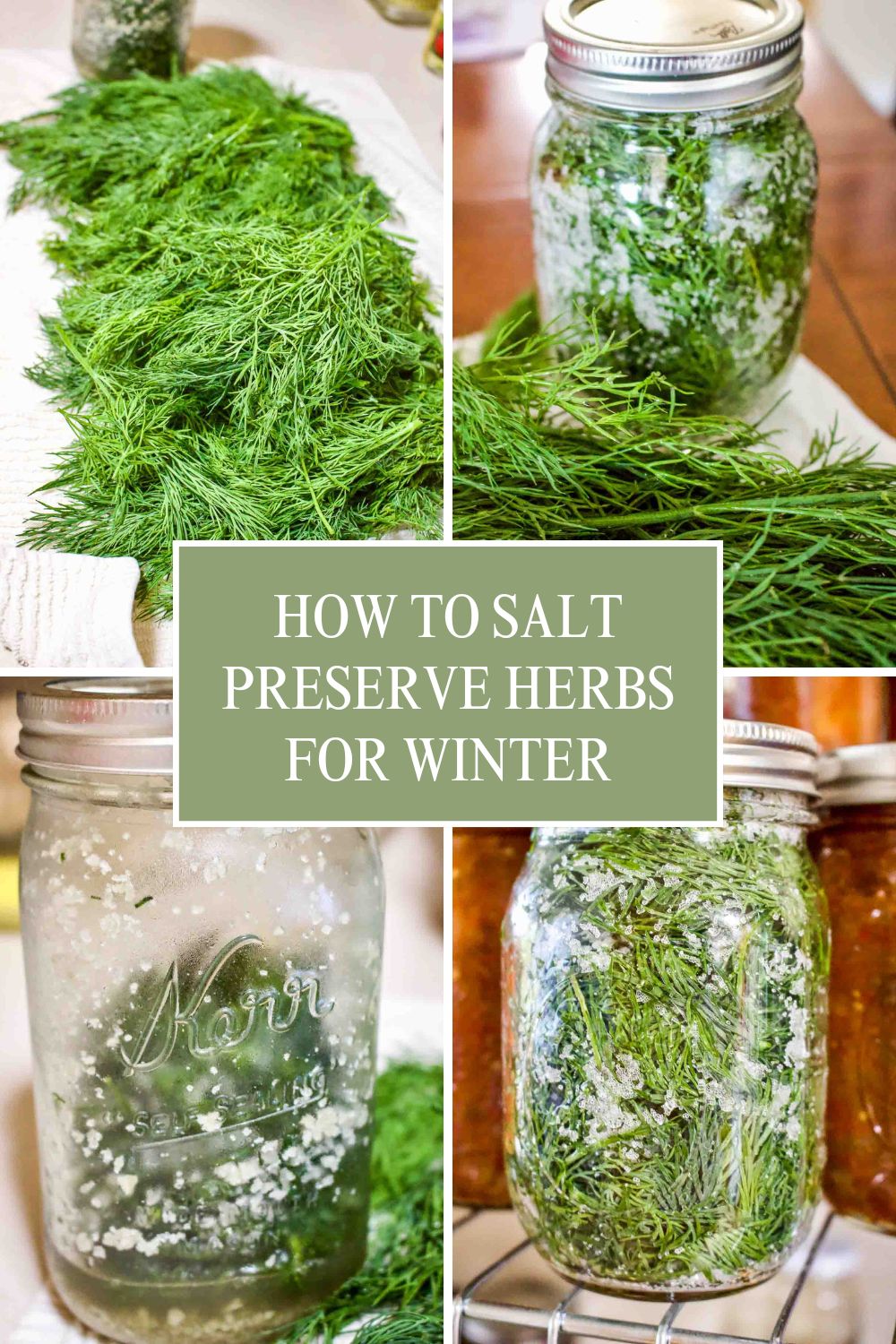
Learn here 8 recipes for canning vegetables for winter.
More Recipes To Love
📖 Recipe
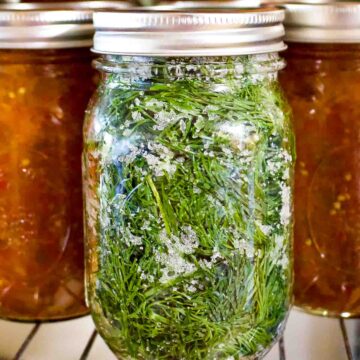
How To Salt Preserve Herbs For Winter
Equipment
Ingredients
- Garden herbs (could be dill, parsley, lovage, thyme, rosemary, marjoram, basil, celery leaves, chives, etc.)
- Salt- could be sea salt kosher salt, pickling salt(do NOT use salt with iodine)
- clean sterilized jars with lids
Instructions
- In a clean glass jar add a layer of salt to cover the bottom.
- Clean, wash and dry the herbs, remove all the thick stems and discard them.
- Add the herbs in layers, alternating with salt, until the container is full. Refrigerate. They should be packed as much as you can, making sure there is enough salt to cover them.
- The next day, you will notice that the herbs lost volume, so the jar is filled only half now. Keep adding salt and new fresh herbs until you fill the jar up again. Refrigerate.
- You will notice that there is dill juice on the bottom of the jar.
- This is ok, as the juice will preserve the dill for the following months.
- The leaves will stay surprisingly fresh and flavorful for months. To use, just remove the amount of herbs you need.
- Brush off the salt or rinse under cold water.
- Make sure you add less salt than the recipe says, the herbs are already salty. As an added bonus, the salt will become flavored over time and can be used in cooking too.
- Consider using it in spaghetti sauce, fish, soup, savory baking, bread or rubs.
- The herbs have to be kept in a cool place. If you live in an apartment, I would keep them in the refrigerator, otherwise, a cellar, garage or a cool pantry.
Notes
- Herb Varieties: Feel free to experiment with different herbs.
- Salt Types: Use kosher, sea, or pickling salt — avoid iodized salt.
- Using Herb-Infused Salt: Reuse the herb-infused salt in other dishes to add a burst of flavor.
- Washing the Herbs: Rinse herbs before use to remove excess salt and maintain balanced flavors in your dishes.
- Health Note: This method allows control over salt intake, offering a healthier alternative to other preservation methods.
- Storage: Ensure herbs are stored in a cool place to retain freshness for several months.

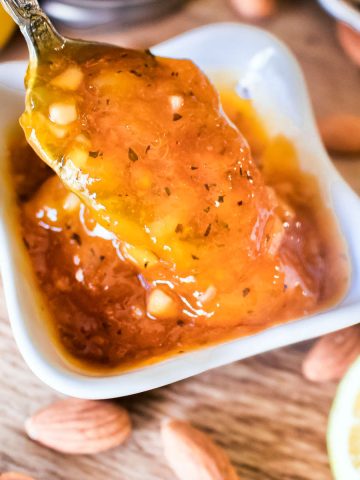

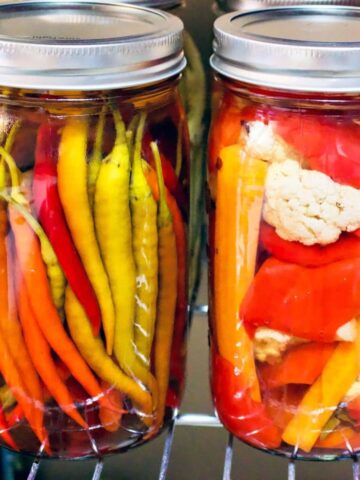
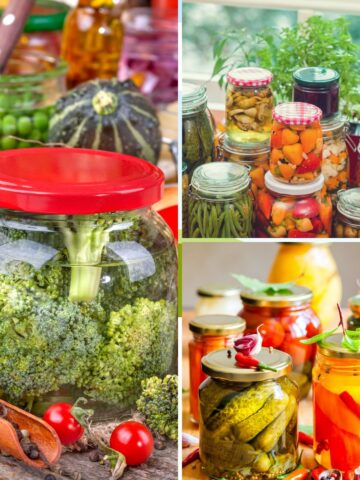
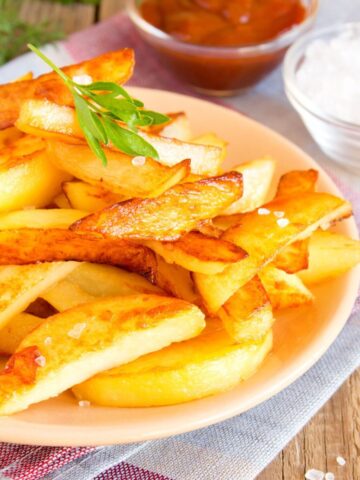
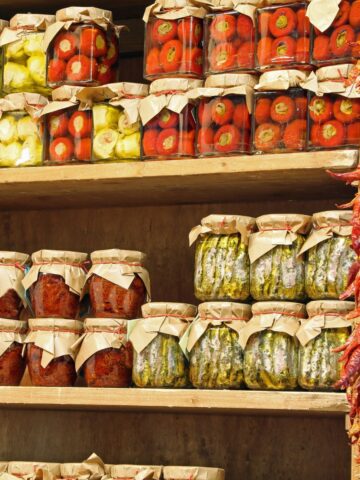
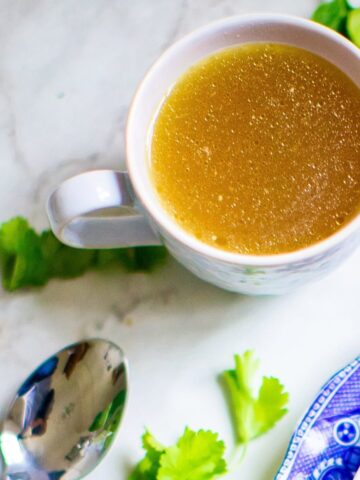
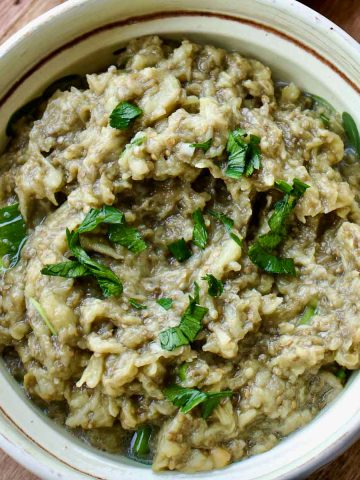
Carolyn Manns says
You have to keep the herbs in salt refrigerated?
The Bossy Kitchen says
Hi Carolyn, they have to be in a cool place. Do you have a cellar, a cold basement? Use that! But if you live in an apartment and you dont have the space(like I do), then the refrigerator would be the way to go.
Alexandrea says
How much do you pack the herbs?
The Bossy Kitchen says
They should be packed as much as you can, making sure there is enough salt to cover them. Keep adding herbs until you fill up the jar. You will notice that the herbs loose volume, so as soon as that happens, keep adding herbs and salt until the jar is full and you cannot add herbs anymore. Keep them in a cool pantry or in the fridge.
Jacky says
Ill try these soon
Sarah says
If you're using herbs like basil with larger leaves, should the leaves be individually separated so they don't glob together and get mushy/rot together?
The Bossy Kitchen says
Hi Sarah, I would chop them first and then salt preserve them.
Susan says
Hello,
Just wondering if you start to fill your jar and you don’t have enough to fill it, how long in between putting your last piece of herb in the jar and putting your next layers? Can you keep adding to your jar for a couple of months or does it need to be within days? Thank you
Kind Regards,
Susan
The Bossy Kitchen says
I would say that you need to fill up the jar the way I explained in the article. Adding fresh herbs after a month will not work, as you will add fresh over already preserved items. This is actually dangerous when it comes to canning. So, the solutions are to either buy a bunch of herbs that would actually fill a jar, use a smaller jar, or freeze the small amounts if they are not enough to salt them. Here you have a recipe for freezing herbs: https://www.thebossykitchen.com/every-day-herb-guide/
Susan says
Thank you
Audrey Spearman says
Have lots of kale - would this salt method work for it?
The Bossy Kitchen says
Definitely no. This recipe works only for herbs, not for leafy cruciferous vegetables or other types of lettuce.
Lolly says
Does this method work for thyme?
The Bossy Kitchen says
It does. The recipe tells you what herbs would work, and thyme is one of them. :- )